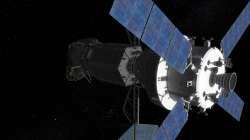NASA assessing possibilities of manned Orion mission to orbit moon
US space agency NASA is considering to assess the feasibility of sending humans to space with the first flight of the Space Launch System rocket as it aims to orbit the Moon. NASA is building

US space agency NASA is considering to assess the feasibility of sending humans to space with the first flight of the Space Launch System rocket as it aims to orbit the Moon.
NASA is building new deep space capabilities to take humans farther into the solar system than we have ever travelled, and ultimately to Mars.
NASA is assessing the feasibility of adding a crew to the first integrated flight of Space Launch System (SLS) rocket and Orion spacecraft, Exploration Mission-1 (EM-1).
A study is already underway to review the technical feasibility, risks, benefits, additional work required, resources needed and any associated schedule impacts to add crew to the first mission.
"Our priority is to ensure the safe and effective execution of all our planned exploration missions with the Orion spacecraft and Space Launch System rocket," said William Gerstenmaier, associate administrator for NASA's Human Exploration and Operations Mission Directorate.
"This is an assessment and not a decision as the primary mission for EM-1 remains an uncrewed flight test," said Gerstenmaier.
The assessment is evaluating the advantages and disadvantages of this concept with regards to short- and long-term goals of achieving deep space exploration capabilities, NASA said.
It will assume launching two crew members in mid-2019, and consider adjustments to the current EM-1 mission profile.
During the first mission of SLS and Orion, NASA plans to send the spacecraft into a distant lunar retrograde orbit, which will require additional propulsion moves, a flyby of the Moon and return trajectory burns.
The mission is planned as a challenging trajectory to test manoeuvres and the environment of space expected on future missions to deep space.
If the agency decides to put crew on the first flight, the mission profile for Exploration Mission-2 would likely replace it, which is an approximately eight-day mission with a multi-translunar injection with a free return trajectory. NASA is investigating hardware changes associated with the system that will be needed if crew are to be added to EM-1.
As a starting condition, NASA would maintain the Interim Cryogenic Propulsion stage for the first flight. The agency will also consider moving up the ascent abort test for Orion before the mission.
Regardless of the outcome for the study, the feasibility assessment does not conflict with NASA's ongoing work schedules for the first two missions. Hardware for the first flight has already started arriving at NASA's Kennedy Space Centre in Florida, where the missions will launch from the agency's historic Pad 39B.
(With inputs from PTI)